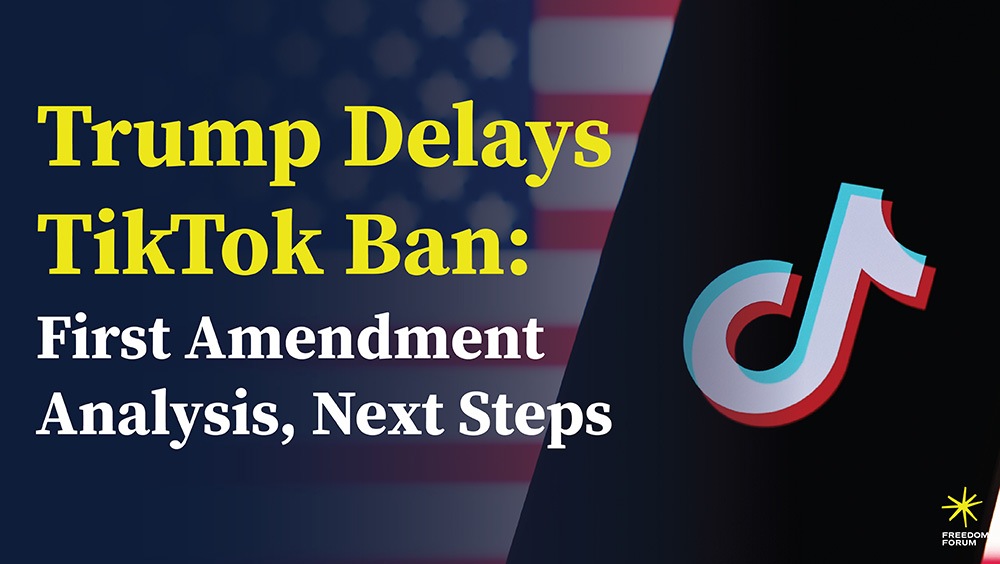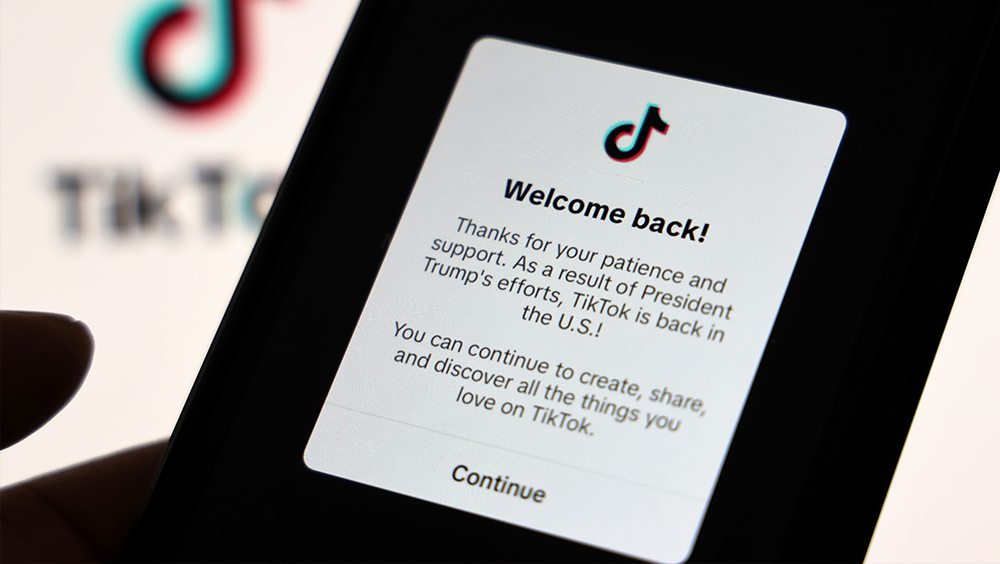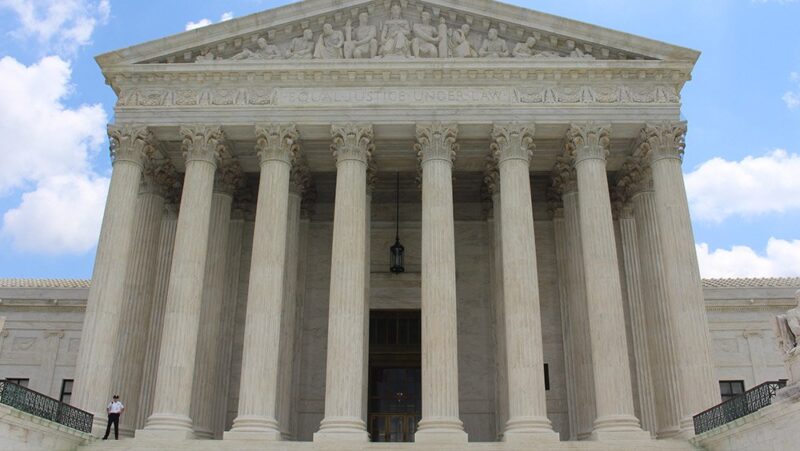Trump Delays TikTok Ban: First Amendment Analysis, Next Steps

On Jan. 17, 2025, the clock struck midnight on TikTok’s First Amendment rights — but subsequent political maneuvering saved the popular social media platform from going dark in the United States for the time being.
The U.S. Supreme Court upheld the decision of the U.S. Court of Appeals for the District of Columbia Circuit that the Protecting Americans from Foreign Adversary Controlled Applications Act — also known as the “TikTok ban” — does not violate the First Amendment.
As a result, ByteDance, the China-based corporation that owns TikTok, would have had to either sell TikTok or stop operating it in the United States on Jan. 19 to avoid billions of dollars in fines. The app did shut down Jan. 18. But Jan. 19, it once again became available to people who had already downloaded it, though it was still unavailable for new downloads through either the Apple or Google app stores.
What happens now, and how does it affect me?
The future of TikTok in the United States was given a short-term reprieve by the executive branch. Former President Joe Biden did not enforce the law in his last 36 hours in office, and President Donald Trump issued an executive order on his first day that prevents enforcement of the law for 75 days.
The executive order states that the delay will allow the new Trump administration to “determine the appropriate course forward in an orderly way that protects national security while avoiding an abrupt shutdown of a communications platform used by millions of Americans.”

Smartphone displaying TikTok popup message on Jan. 20, 2025, welcoming users back to the app.
The executive order also says that neither TikTok nor other companies such as Apple and Google that made TikTok available to the public via app stores can be punished for any actions they took between when the law went into effect Jan. 19 and when the executive order was issued Jan. 20.
This is not the end of the story, as there are several unanswered questions. None of these are First Amendment questions, but they are all things you may have heard about in the news:
- Is this executive order legal? The law allows the president to grant a 90-day delay of the ban if there is considerable progress toward TikTok’s sale. But Trump issued a 75-day delay and did not cite any progress toward a sale.
- If it isn’t legal, will anyone challenge the executive order in court? If so, does the law stay in effect?
- What happens if there is no sale of TikTok within 75 days? The law allows for a single 90-day pause in enforcing the law but doesn’t mention renewal.
- Will TikTok be sold in whole or in part? If so, to whom? And can that be done in 75 days?
- Will Congress pass another law that rescinds the TikTok ban?
While TikTok remains available in the United States for now, its long-term future is far from certain.
How did we get here?
Congress passed the Protecting Americans from Foreign Adversary Controlled Applications Act, which President Joe Biden signed on April 24, 2024. The law requires ByteDance Ltd., the Chinese company that owns TikTok, to take one of three actions by Jan. 19, 2025:
- Sell the app.
- Stop making the app available in the U.S.
- Pay a fine of $5,000 per user. This fine would also be imposed on any other company that makes TikTok available in the U.S., such as the Google and Apple app stores.
TikTok Inc., a U.S.-based corporation, sued, arguing the law violates the First Amendment protection of freedom of speech. The company was joined in its challenge of the law by eight TikTok creators and by the nonprofit BASEDPolitics, which uses social media to promote free markets and individual liberties to younger audiences.
Lawmakers claimed that the TikTok app allows ByteDance to share Americans’ personal information with the Chinese government, which could then spread anti-American propaganda in a way that threatens U.S. national security.
The U.S. Court of Appeals for the District of Columbia Circuit held that the law does not violate the First Amendment. In a ruling issued on Dec. 6, 2024, a three-judge panel of the court agreed with the government’s claims about national security and that a ban is the best way to avoid those threats.
TikTok immediately sought Supreme Court review, and the court heard the case Jan. 10. The Supreme Court issued its decision Jan. 17 and President Trump issued his executive order Jan. 20.
What did the Supreme Court say?
On Jan. 17 (three days prior to President Trump’s executive order), the court issued a “per curiam” decision, meaning no single justice is identified as the author of the ruling and indicating that all justices agreed. There were no dissenting opinions.
The court said that it is not clear that the law directly regulates expression of any kind. It does not actually subject TikTok’s content creators to potential punishment of any kind. As to ByteDance and TikTok, the law is merely a regulation of corporate structure, requiring ByteDance to decide whether to sell the U.S.-based subsidiary or not. The court could have stopped there and held that this isn’t even a First Amendment case at all — but it didn’t.
Instead, the court acknowledged that this may indirectly impact First Amendment-related activities like TikTok’s content moderation and its users’ ability to generate content and associate with other like-minded people. It analyzed whether this law violates the First Amendment, holding that it does not.
The court first decided that the law is “content neutral.” Again, it does impact TikTok’s and its creators’ speech in some way. But the purpose of the law isn’t to target speech and expression on TikTok based on its content and message. Instead, the court said the purpose of the law is simply to prevent China from collecting sensitive personal information from more than 170 million people in the United States. The court noted the uniqueness of this case:
“TikTok’s scale and susceptibility to foreign adversary control, together with the vast swaths of sensitive data the platform collects, justify differential treatment to address the Government’s national security concerns.”
Because the law is content neutral, the government only needed to show that there is an “important” government interest for the law and that the law does not burden a substantial amount of speech to achieve that interest. The court held that the government satisfied both parts of this “intermediate scrutiny” test.
The law’s stated purpose of preventing China — a foreign adversary — from forcing ByteDance to hand over the personal data of U.S. TikTok users is sufficiently important. It is worth noting that the court relied only on publicly available information to reach this conclusion, without relying on additional classified information the government had provided to the court in confidence. The court cited publicly available reports from Congress noting that:
“TikTok’s data collection practices extend to age, phone number, precise location, internet address, device used, phone contacts, social network connections, the content private messages sent through the application, and videos watched …
“TikTok collects user data, user content, behavioral data (including “keystroke patterns and rhythms”), and device and network data (including device contacts and calendars).”
The court also deferred to the government’s conclusion that the collection of this data presented a threat to the national security of the United States because China “has engaged in extensive and yearslong efforts to accumulate structured datasets, in particular on U.S. persons, to support its intelligence and counterintelligence operations.”
The court also held that this law directly advances Congress’ goal of protecting national security because:
- None of the alternatives TikTok suggests, including increased transparency around how TikTok and ByteDance collect and share information, restrictions on that collection and sharing, and a proposed agreement to directly share information with the U.S. government, are strong enough to protect national security. In any event, intermediate scrutiny does not require that these alternatives be used, only that the ban protects national security.
- The ban is conditional, not mandatory. ByteDance has a choice on whether or not it will sell TikTok.
The court’s decision was not surprising, given that the justices seemed ready to rule for the government during oral argument. While this decision will be a shock to many – especially TikTok users – First Amendment advocates may take heart in the fact that the court seemed to rely on the unique facts of this case and therefore might not support a similar ban – even based on national security concerns – in a case where a foreign adversary of the United States was not involved.
This article was updated Jan. 22, 2025. It will be updated with future developments.
Kevin Goldberg is a First Amendment specialist for Freedom Forum. He can be reached at kgoldberg@freedomforum.org.
Why Government Officials Don’t Have to Use Bible for Oath of Office
Supreme Court To Tackle Rare First Amendment Test Of Freedom Of Association
Related Content
Religion. Speech. Press. Assembly. Petition.
Learn about the First Amendment.

